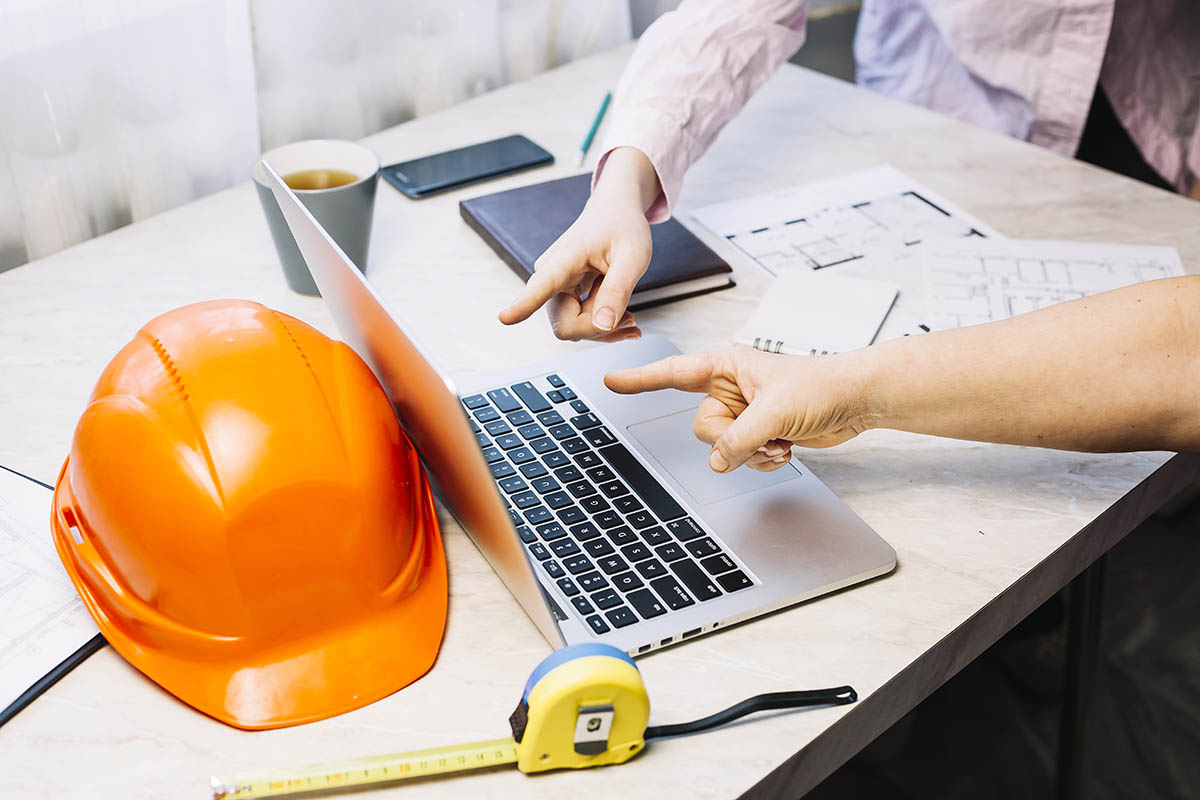

We may earn revenue from the products available on this page and participate in affiliate programs. Learn More ›
When tackling a major home improvement or renovation project, people often enlist the help of a professional contractor. A contractor is responsible for coordinating and completing every step of the project, from estimating costs to securing permits to completing and overseeing the hands-on work.
But what is a contractor, and what exactly does one do? Contractors can tackle a wide range of projects, including roofing, siding, decks, and bathroom and basement remodeling. They may also hire subcontractors for more specialized tasks such as plumbing and electrical work.
Homeowners seeking help for a home improvement project may be wondering: How do I find qualified, professional contractors near me? This guide will give homeowners more information about finding a local contractor, including typical costs, the scope of work, and key questions to ask.
The Cost to Hire a Contractor

General contractors typically charge a fee that amounts to 10 to 20 percent of the total cost of construction. It’s determined by factors such as cost of labor, materials, insurance, and more. The national average cost for hiring a contractor is $4,000, according to HomeAdvisor, but it can be as low as $250 and as high as $58,000, depending on the scope of the project. Rates will also vary based on location and whether the contractor works with local suppliers for the project. General contractors pay on the homeowner’s behalf for labor and materials, so if they can negotiate a lower price for material and shipping, homeowners will ultimately be responsible for a lower total cost. Rates also vary greatly based on the size and scope of a project. For example, hiring a general contractor to remodel a bathroom typically costs between $1,000 to $2,000 (in addition to the cost of the project), while building a house can cost up to $58,000 in general contractor fees alone.
Common Issues a Contractor Can Fix
The best home renovation contractors can assess and repair many issues a homeowner might face. Generally speaking, if there are concerns regarding the structural integrity of the home, calling a contractor is the smartest move. Some of the most common problems a contractor can handle are listed below.
Roof Damage
Harsh weather, aging shingles, and lack of regular maintenance can all contribute to roof damage. In these cases it’s best to figure out how to hire the best roof contractor quickly and get quotes from reputable professionals. This is especially true if the roof is leaking or if shingles have blown away.
Broken Window Seals
Insulated glass unit (IGU) windows that are exposed to a lot of sunshine are susceptible to broken seals. Any other damage to the sealant material is likely to require the expertise of a contractor. Broken seals can prevent a home’s windows from keeping out air and humidity. While this is not a major emergency in terms of safety, gas and electric bills can rise until the issue is addressed.
Attic Insulation or Structural Issues
Too much or too little insulation in attics and insulation with cracks or openings to the outside won’t be as effective in regulating heat and cool air. Additionally, storms can cause water penetration and pest infestations in attics. It’s advised to consult with a contractor as soon as possible.

Common Projects
When hiring a contractor, it is important for homeowners to look for the right kind of contractor for the job. For instance, a general contractor does not typically do electrical or plumbing repairs—these would fall under the skill set of an electrician and a plumber, respectively. The following are some common projects a contractor can handle and their associated costs.
Home Building or Extending
Homeowners looking to build a new home or add on to an existing one will need to find a residential general contractor with construction experience. On average, it costs around $282,000 to build a house. Homeowners can expect to pay an additional $28,000 to $56,000 to hire a contractor. The cost for building home additions is about $46,750, and hiring one of the best construction contractors to oversee the job can cost an additional $4,700 to $9,400.
Garage Building
The average cost to build a garage is around $27,500, depending on the size of the structure and whether or not it is prefabricated. Enlisting the help of building contractors for this job will cost an extra $2,750 to $5,500.
Whole-Home Remodeling
Whole-home remodeling can be an alternative to moving or constructing a new home, but it’s an extensive project. Home remodeling costs are usually close to $47,830. To have a contractor oversee the work will cost an additional $4,750 to $9,500.
Bathroom Remodeling
Bathroom remodeling can include changing the layout of the room in addition to cosmetic changes, which is a major consideration when deciding whether to DIY or hire a pro for bathroom remodeling. The average rate for a bathroom remodel project is about $11,150, and homeowners can expect to pay an extra $1,100 to $2,200 to hire bathroom remodeling contractors.
Kitchen Remodeling
One of the most common remodeling projects, kitchen remodeling can greatly increase the home’s value—when it’s done well. The average kitchen remodel costs $25,850, and many homeowners find it worth it to pay an additional $2,600 to $5,200 for a kitchen remodeling contractor.
Drywall Installation
Whether adding a single wall or drywalling an entire home, the price for drywall installation is usually charged per square foot. The average drywall project costs $1,880, but hiring a drywall contractor for this task will cost an additional $185 to $370.
Exterior Wall Building
The cost to build an exterior wall with materials like brick and stone falls around $5,000. An experienced contractor can ensure the new exterior wall is sturdy and can support the home. Expect to pay an extra $500 to $1,000 for a contractor to complete this project.
Deck Building
A new deck will cost homeowners about $7,750 depending on the size and the materials that are used. The additional cost for a contractor is about $775 to $1,500.
Patio Installation
Having a concrete patio installed most often costs about $3,000, but prices can vary based on square footage. The price to hire a paving contractor for patio installation is about $300 to $600.
Fence Installation
Fence installation can vary in both price and difficulty depending on the material and size of the property. Most fence installation projects cost around $3,000, with an additional $300 to $600 to hire fence contractors.
Driveway Installation
Homeowners can expect to pay about $4,650 on average to have a new driveway installed, and asphalt contractors will charge about $465 to $930 for this project.
Do I Need a Contractor?
Depending on the situation, it may not be necessary to enlist the expertise of a contractor. However, in some cases, such as in certain emergencies or when a project requires expert experience, hiring a local contractor may be necessary.
Emergencies
Certain home emergencies will require the expertise of a contractor. For example, broken windows and leaky roofs should be addressed by a professional as soon as possible to prevent further damage. However, smaller maintenance issues that don’t impact the structural integrity of the home don’t necessarily require the services of a contractor. A faulty electrical outlet, for instance, can typically be replaced by a handyman or homeowner who has experience working with electricity. Basic toilet issues, such as a worn or damaged flapper valve, can be repaired by a homeowner using off-the-shelf repair kits, provided they have the right expertise. The best rule of thumb is to call in a professional if these emergency repairs are above the comfort or skill level of the homeowner, or if past repair attempts have not been successful.
Non-Emergencies
Contractors can and often do work on non-urgent home repairs such as exterior upgrades and interior remodels. Some of these repairs can be necessary before a home inspection. For instance, when purchasing or selling a home, it’s best to call a contractor to address any issues that could come up during a home inspection. Separately, major home remodeling projects typically require a contractor’s expertise, as these often require multiple permits and professionals to get the job done. Simple cosmetic repairs, on the other hand, can typically be taken care of by the homeowner or a handyman. Painting, basic lawn maintenance, patching holes, and cleaning out gutters or the garbage disposal are all tasks that don’t require the expertise of a contractor.
Other Considerations
For large-scale home improvement projects, such as a kitchen renovation or siding replacement, it’s best to call in a contractor. Their expertise and connections can make the process significantly easier, allowing homeowners to turn their dreams into reality.

Benefits of Hiring a Contractor
While the added costs of hiring a contractor are not insignificant, there are some substantial benefits to leaving the details of a large home project in the hands of an experienced pro. With the following factors in mind, homeowners may find it well worth it to entrust their remodel or construction project to a contractor.
Time and Money Savings
It’s a given that general contractors are more skilled than the average homeowner at the hands-on aspects of home construction and remodeling. But good contractors are also masters of efficiency. Home projects involve a lot of moving parts, including hiring subcontractors, obtaining materials, and scheduling deliveries. Contractors know how to prioritize tasks in such a way that the project runs smoothly from start to finish, saving homeowners time and money. They also typically have resources and contacts that allow them to find the highest quality materials at the best price.
Peace of Mind
A home renovation project usually involves some level of stress, with or without a contractor. But the ability to put the project in the hands of someone who has done it before eliminates many of the fears that come with DIY, like wondering if all the necessary permits have been obtained and whether the work will stand up to an inspection. Having a contractor does not guarantee that nothing will go wrong, but since contractors are licensed and insured, the possibility of an accident or an injury will be less daunting.
One Point of Contact
The general contractor will more than likely not be the only person physically carrying out a project. More often the contractor will oversee the work and hire subcontractors on behalf of the homeowner. Rather than coordinating with electricians, plumbers, material suppliers, and delivery people, homeowners can direct their questions and concerns to the contractor and trust that they will handle the details.
Increased Home Value
For those looking to sell, hiring a contractor to renovate a home’s interior and exterior can really pay off. They can help to transform a home into a more functional and appealing space for potential buyers, even on a strict budget or timeline.
Improved Curb Appeal
Whether a homeowner is looking to sell or just wants to make improvements for themselves, exterior improvements like roofing and siding can boost curb appeal.
DIY vs. Hiring a Professional Contractor
With all the above considerations in mind, homeowners may wonder whether it’s best to hire a contractor or tackle the project themselves. In some cases, taking the DIY approach can reduce costs; in others, having a professional handle the work is a better investment.
If a home improvement project falls within the homeowner’s skill set, hiring a contractor may not be a necessary expense. Some homeowners can confidently tackle cosmetic repairs, including painting interior walls and installing certain kinds of flooring. Those with basic carpentry, electrical, and plumbing skills can take on even more projects and repairs. Conducting research into a project can help bridge any skill gaps for basic projects.
For more complicated projects, a homeowner can certainly do the necessary research and even attempt to complete the project on their own. However, expenses can add up quickly, especially if mistakes are made and need to be repaired along the way. This is especially true for projects that need to pass a home inspection and require permit approval. This is the time to critically evaluate factors like skill level and the amount of time that will need to be invested.
Generally speaking, a homeowner will want to consider calling in a professional in the following circumstances:
- The home is producing unfamiliar sounds and smells that cannot be attributed to any other factors.
- They do not have the time to devote to completing the project, including obtaining the necessary permits.
- They do not have experience in this particular area of home improvement.
- Safety is at risk.
- The project needs to pass inspection or it could present a problem in a future home sale.

How to Find a Reputable Contractor
When hiring a professional contractor, it’s important to conduct thorough research. A contractor should have the necessary qualifications and experience to complete the renovation project effectively. What follows are some factors to consider when looking for the best local contractors and tips for how to choose judiciously.
- Look for a professional with an established business and reputation. Ask for recommendations from friends or acquaintances who can speak to the contractor’s work and skills.
- Ask for estimates from more than one professional before making a final decision. Be wary of contractors who promise significantly faster time frames or lower costs than the others, as this may signal an inferior quality of work.
- Ensure the contractor has the necessary certifications, qualifications, and experience to complete the home improvement project. Verify their general contractor license through the state board, check their professional references, and reach out to the local Better Business Bureau and local credit bureau.
- Ask the contractor to provide a copy of their general liability insurance policy, and make sure they have workers’ comp insurance.
Additional considerations that factor into how to hire a general contractor include geographic location, place and type of residence, and personal budget and timeline.
How to Save Money on Hiring a Contractor
Many homeowners find the peace of mind and quality of work that comes with hiring a contractor to be worth every penny. But it’s still wise to explore ways to save on general contractor cost in order to protect the project’s budget. The following are some strategies to help homeowners get the best price:
- Get quotes from multiple contractors.
- Help the contractor give the most accurate quote by being specific about the details of the project.
- Negotiate—the contractor may be willing to come down on price if they know that the homeowner is considering multiple options.
- Ask the contractor about the materials they will be using and whether more affordable options are available.
- Consider scheduling the project during a slower season.
Questions to Ask Your Local Contractor
Asking a local contractor the right questions at the outset can minimize miscommunication and help get the best possible results. The following are some recommended questions to ask a contractor throughout the home renovation process.
Before hiring a contractor and starting the project:
- How long have you been in the industry? Do you guarantee your work?
- What is the estimated cost and timeline for completion, including cleanup? Can you provide it in writing?
- Have you completed other similar projects? If so, what challenges may arise, and how will you address them?
- Can you provide your subcontractors’ license(s), insurance, and references?
- What is the payment agreement structure?
During the project, if there is a problem:
- How will you fix this? What are the next steps?
- What additional costs/time will be added?
- What do you need from me to expedite the process?
After the project:
- To whom do I address payment?
- Where can I leave a review or testimonial? (Like many service businesses, contractors rely on word-of-mouth referrals and will greatly appreciate a recommendation.)

FAQs
Hiring a contractor can be a confusing and daunting process, especially for first-timers. The following are some frequently asked questions along with their answers to help guide homeowners in their decision to hire a contractor.
If the contractor doesn’t finish the job, the first step is to compile the necessary paperwork and evidence that the contractor is not working in a timely manner or has completely abandoned the job. Then, it’s recommended that homeowners consult a lawyer before formally firing a contractor and asking for a refund.
Generally, contractors will give free estimates depending on the size, nature, and complexity of the job. Contractors are likely to offer free estimates for smaller jobs like window cleaning or painting.
However, for larger tasks, contractors may require a fee ranging anywhere from $150 to $1,000. Elaborate projects like a home renovation or remodel may require a consultation, which is a multiple-step process that includes formulating plans, drawing up designs, and even visiting the space, which can be both time-consuming and resource-intensive. Similarly, an estimate is less likely to be free when the task involves diagnosing the source of a problem (such as a leak) in addition to treating the problem itself.
Typically, a general contractor can handle most home improvement or repair projects. This person may or may not be licensed. If a general contractor is licensed, it means that this person has experience, knowledge, training, and certifications or licenses. It’s advisable to opt for a licensed general contractor rather than an unlicensed one; unlicensed individuals may not be able to offer insurance, such as workers’ compensation insurance, in the event a worker has an accident while working on the property. A contractor’s license doesn’t just serve to ensure that this person’s work is up to code; it also protects the homeowner from liability.
Sources: HomeAdvisor
